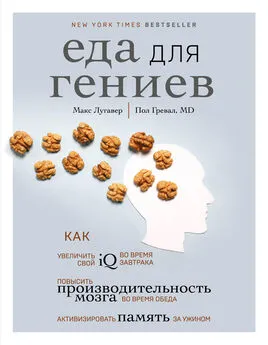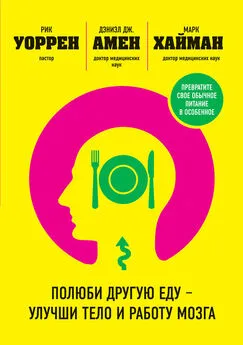Пол Гревал - Еда для гениев. Как увеличить свой IQ во время завтрака, повысить производительность мозга во время обеда и активизировать память за ужином
- Название:Еда для гениев. Как увеличить свой IQ во время завтрака, повысить производительность мозга во время обеда и активизировать память за ужином
- Автор:
- Жанр:
- Издательство:неизвестно
- Год:2018
- ISBN:978-5-04-106695-6
- Рейтинг:
- Избранное:Добавить в избранное
-
Отзывы:
-
Ваша оценка:
Пол Гревал - Еда для гениев. Как увеличить свой IQ во время завтрака, повысить производительность мозга во время обеда и активизировать память за ужином краткое содержание
Макс Лугавер совместно с доктором медицины Полом Гревалом разработали «гениальную программу», которая поможет улучшить работу мозга, память, способность анализировать и стать энергичнее и продуктивнее, а также защитить мозг от преждевременного старения или избавиться от симптомов когнитивных нарушений.
Вы узнаете, какую еду предпочитает ваш мозг, что для него польза, а что – настоящий яд, какой вид стресса помогает нам концентрироваться и какие физические нагрузки запускают процесс очистки мозга от вредных воспалений. Бонусом программы станут хорошее настроение, продуктивность, потеря лишних килограммов и профилактика заболеваний мозга.
В формате PDF A4 сохранен издательский макет книги.
Еда для гениев. Как увеличить свой IQ во время завтрака, повысить производительность мозга во время обеда и активизировать память за ужином - читать онлайн бесплатно ознакомительный отрывок
Интервал:
Закладка:
184
P. K. Elias et al., «Serum Cholesterol and Cognitive Performance inthe Framingham Heart Study» Psychosomatic Medicine 67, no. 1 (2005): 24–30.
185
R. West et al., «Better Memory Functioning Associated with Higher Total and Low-Density Lipoprotein Cholesterol Levels in Very Elderly Subjects withoutthe Apolipoprotein e4 Allele» American Journal of Geriatric Psychiatry 16, no. 9 (2008): 781–85.
186
B. G. Schreurs, «The Effects of Cholesterol on Learning and Memory» Neuroscience & Biobehavioral Reviews 34, no. 8 (2010): 1366–79; M. M. Mielke et al., «High Total Cholesterol Levels in Late Life Associated with a Reduced Risk of Dementia» Neurology 64, no. 10 (2005): 1689–95.
187
Credit Suisse, «Credit Suisse Publishers Report on Evolving Consumer Perceptions about Fat» PR Newswire , September 17, 2015, http://www.prnewswire.com/news-releases/credit-suisse-publishes-report-on-evolving-consumer-perceptions-about-fat300144839.html.
188
Marja-Leena Silaste et al., «Changes in Dietary Fat Intake Alter Plasma Levels of Oxidized Low-Density Lipoprotein and Lipoprotein(a)» Arteriosclerosis, Thrombosis, and Vascular Biology 24, no. 3 (2004): 495–503.
189
Patty W. Siri-Tarino et al., «Saturated Fatty Acids and Risk of Coronary Heart Disease: Modulation by Replacement Nutrients» Current Atherosclerosis Reports 12, no. 6 (2010): 384–90.
190
V. A. Mustad et al., «Reducing Saturated Fat Intake Is Associated with Increased Levels of LDL Receptors on Mononuclear Cells in Healthy Men and Women» Journal of Lipid Research 38, no. 3 (March 1997): 459–68.
191
L. Li et al., «Oxidative LDL Modification Is Increased in Vascular Dementia and Is Inversely Associated with Cognitive Performance» Free Radical Research 44, no. 3 (2010): 241–48.
192
Steen G. Hasselbalch et al., «Changes in Cerebral Blood Flow and Carbohydrate Metabolism during Acute Hyperketonemia» American Journal of Physiology – Endocrinology and Metabolism 270, no. 5 (1996): E746–51.
193
E. L. Wightman et al., «Dietary Nitrate Modulates Cerebral Blood Flow Parameters and Cognitive Performance in Humans: A Double-Blind, Placebo-Controlled, Crossover Investigation» Physiological Behavior 149 (2015): 149–58.
194
Riaz Memon et al., «Infection and Inflammation Induce LDL Oxidation In Vivo» Arteriosclerosis, Thrombosis, and Vascular Biology 20 (2000): 1536–42.
195
A. C. Vreugdenhil et al., «LPS-Binding Protein Circulates in Association with ApoB-Containing Lipoproteins and Enhances Endotoxin-LDL/VLDL Interaction» Journal of Clinical Investigation 107, no. 2 (2001): 225–34.
196
B. M. Charalambous et al., «Role of Bacterial Endotoxin in Chronic Heart Failure: The Gut ofthe Matter» Shock 28, no. 1 (2007): 15–23.
197
Stephen Bischoff et al., «Intestinal Permeability – A New Target for Disease Prevention and Therapy» BMC Gastroenterology 14 (2014): 189.
198
C. U. Choi et al., «Statins Do Not Decrease Small, Dense Low-Density Lipoprotein» Texas Heart Institute Journal 37, no. 4 (2010): 421–28.
199
Совокупность морфологических структур, физиологических и физико-химических механизмов, функционирующих как единое целое и регулирующих потоки веществ между кровью и тканью мозга. – Прим. ред.
200
Melinda Wenner Moyer, «It’s Not Dementia, It’s Your Heart Medication: Cholesterol Drugs and Memory» Scientific American , September 1, 2010, https://www.scientificamerican.com/article/its-not-dementia-its-your-heart-medication/.
201
«Coenzyme Q10» Linus Pauling Institute – Macronutrient Information Center, Oregon State University, http://lpi.oregonstate.edu/mic/dietary-factors/coenzyme-Q10.
202
I. Mansi et al., «Statins and New-Onset Diabetes Mellitus and Diabetic Complications: A Retrospective Cohort Study of US Healthy Adults» Journal of General Internal Medicine 30, no. 11 (2015): 1599–610.
203
Shannon Macauley et al., «Hyperglycemia Modulates Extracellular Amyloid-B Concentrations and Neuronal Activity In Vivo» Journal of Clinical Investigation 125, no. 6 (2015): 2463–67. Гениальная еда № 5. Яйца
204
C. N. Blesso et al., «Whole Egg Consumption Improves Lipoprotein Profiles and Insulin Sensitivity to a Greater Extent than Yolk-Free Egg Substitute in Individuals with Metabolic Syndrome» Metabolism 62, no. 3 (2013): 400–10.
205
Garry Handelman et al., «Lutein and Zeaxanthin Concentrations in Plasma after Dietary Supplementation with Egg Yolk» American Journal of Clinical Nutrition 70, no. 2 (1999): 247–51. Глава 6. Топливо для мозга
206
L. Kovac, «The 20 W Sleep-Walkers» EMBO Reports 11, no. 1 (2010): 2.
207
NCD Risk Factor Collaboration, «Trends in Adult Body-Mass Index.»
208
Естественное и искусственное удаление токсинов из организма. – Прим. ред.
209
Institute for Basic Science, «Team Suppresses Oxidative Stress, Neuronal Death Associated with Alzheimer’s Disease» ScienceDaily , February 25, 2016, https://www.sciencedaily.com/releases/2016/02/160225085645.htm.
210
J. Ezaki et al., «Liver Autophagy Contributes tothe Maintenance of Blood Glucose and Amino Acid Levels» Autophagy 7, no. 7 (2011): 727–36.
211
Геронтология – наука, изучающая биологические, социальные и психологические аспекты старения человека, его причины и способы борьбы с ним. – Прим. ред.
212
H. White and B. Venkatesh, «Clinical Review: Ketones and Brain Injury» Critical Care 15, no. 2 (2011): 219.
213
R. L. Veech et al., «Ketone Bodies, Potential Therapeutic Uses» IUBMB Life 51, no. 4 (2001): 241–47.
214
S. G. Jarrett et al., «The Ketogenic Diet Increases Mitochondrial Glutathione Levels» Journal of Neurochemistry 106, no. 3 (2008): 1044–51. 8. Sama Sleiman et al., «Exercise Promotesthe Expression of Brain Derived Neurotrophic Factor (BDNF) throughthe Action ofthe Ketone Body β-Hydroxybutyrate» Cell Biology (2016).
215
Hasselbalch, «Changes in Cerebral Blood Flow.»
216
Jean-Jacques Hublin and Michael P. Richards, eds., The Evolution of Hominin Diets: Integrating Approaches tothe Study of Palaeolithic Subsistence (Springer Science & Business Media, 2009).
217
S. T. Henderson, «Ketone Bodies as a Therapeutic for Alzheimer’s Disease» Neurotherapeutics 5, no. 3 (2008): 470–80.
218
Состояние, развивающееся в результате углеводного голодания клеток. – Прим. ред.
219
Большая группа заболеваний преимущественно позднего возраста, для которых характерна медленно прогрессирующая гибель определенных групп нервных клеток и одновременно – постепенно нарастающая атрофия соответствующих отделов головного и спинного мозга. – Прим. ред.
220
S. Brandhorst et al., «A Periodic Diet that Mimics Fasting Promotes Multi-System Regeneration, Enhanced Cognitive Performance, and Healthspan» Cell Metabolism 22, no. 1 (2016): 86–99.
221
Caroline Rae et al., «Oral Creatine Monohydrate Supplementation Improves Brain Performance: A Double-Blind, Placebo-Controlled, Cross-over Trial» Proceedings ofthe Royal Society of London B: Biological Sciences 270, no. 1529 (2003): 2147–50.
222
J. Delanghe et al., «Normal Reference Values for Creatine, Creatinine, and Carnitine Are Lower in Vegetarians» Clinical Chemistry 35, no. 8 (1989): 1802–3.
223
Rafael Deminice et al., «Creatine Supplementation Reduces Increased Homocysteine Concentration Induced by Acute Exercise in Rats» European Journal of Applied Physiology 111, no. 11 (2011): 2663–70.
224
David Benton and Rachel Donohoe, «The Influence of Creatine Supplementation onthe Cognitive Functioning of Vegetarians and Omnivores» British Journal of Nutrition 105, no. 7 (2011): 1100–1105.
225
Rachel N. Smith, Amruta S. Agharkar, and Eric B. Gonzales, «A Review of Creatine Supplementation in Age-Related Diseases: More than a Supplement for Athletes» F1000Research 3 (2014).
226
Terry McMorris et al., «Creatine Supplementation and Cognitive Performance in Elderly Individuals» Aging, Neuropsychology, and Cognition 14, no. 5 (2007): 517–28.
227
M. P. Laakso et al., «Decreased Brain Creatine Levels in Elderly Apolipoprotein E ε4 Carriers» Journal of Neural Transmission 110, no. 3 (2003): 267–75.
228
A. L. Rogovik and R. D. Goldman, «Ketogenic Diet for Treatment of Epilepsy» Canadian Family Physician 56, no. 6 (2010): 540–42.
229
Zhong Zhao et al., «A Ketogenic Diet as a Potential Novel Therapeutic Intervention in Amyotrophic Lateral Sclerosis» BMC Neuroscience 7, no. 29 (2006).
230
R. Krikorian et al., «Dietary Ketosis Enhances Memory in Mild Cognitive Impairment» Neurobiology of Aging 425, no. 2 (2012): 425e19–27; Matthew Taylor et al., «Feasibility and efficacy data from a ketogenic diet intervention in Alzheimer’s disease» Alzheimer’s & Dementia: Translational Research and Clinical Interventions (2017).
231
S. Djiogue et al., «Insulin Resistance and Cancer: The Role of Insulin and IGFs» Endocrine-Related Cancer 20, no. 1 (2013): R1–17.
232
Harber, «Alterations in Carbohydrate Metabolism.»
233
Совокупность разнообразия генов микробиоты различных экологических ниш. – Прим. ред.
Читать дальшеИнтервал:
Закладка:










